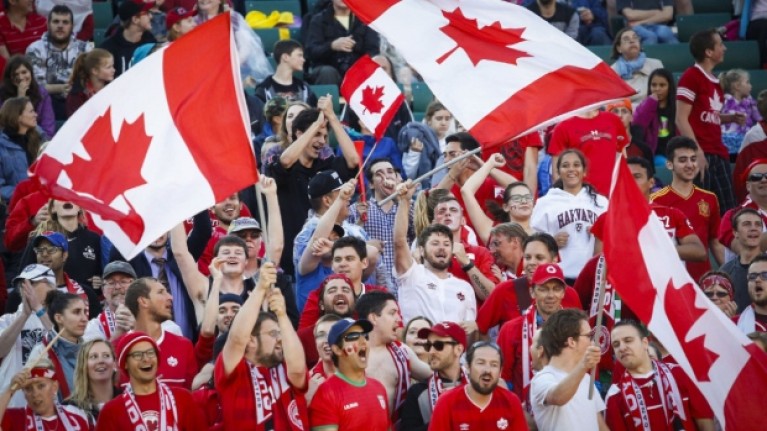

So We Lost: How Soccer Fans Fall Short in the Canadian Game
There is a deep irony in Canadian soccer criticism, where the real problem is with the critics themselves
Last year, our Canadian Men’s and Women’s National Soccer Teams suffered disappointing defeats in major international tournaments. The Men’s team exited the CONCACAF Gold Cup at the Quarter Final stage after losing 3-2 to Haiti, and the Women’s team exited the FIFA Women’s World Cup at the same stage, following a 1-0 defeat to Sweden.
While both our Men’s and Women’s teams may have performed well enough overall in their respective tournaments, their early exits have prompted a great deal of criticism from Canadian soccer fans and members of the media.
The Canadian public expects better performances from its Men’s and Women’s National Teams in international competitions, and critical coverage suggests that many recent performances have not lived up to these expectations.
There is a deep irony, here. We as Canadians are more responsible for the performances of our Men’s and Women’s National Teams than we think. We don’t give nearly enough attention and support to local, Canadian soccer, and that is the fundamental Achilles heel of the beautiful game in Canada.
Think about it. If you’re reading this article, you are probably Canadian; you are probably a soccer fan; and you are probably, at least slightly, disappointed with the Canadian Teams’ results in the recent CONCACAF Gold Cup and FIFA Women’s World Cup.
You also probably have no idea what the score of the latest Men’s or Women’s Ontario League 1 match was, or the most recent Canadian Premier League (CPL) match, or any of the recent U-Sports Canadian university matches…
You get the picture.
Conversely, you probably can list off the winners of the past 5-10 UEFA Champions League tournaments, as well as – depending on which foreign league you follow – the winners of the most recent English Premier League, Italian Serie A, or Spanish La Liga trophy.
Why is this such a problem?
The answer lies in what may be the most important characteristic that separates Canada from other, more successful, soccer nations: culture.
I’ve written about the importance of culture – or more specifically, the lack thereof – in Canadian soccer before.
In an article written and published in September, 2016, I compared the Canadian soccer culture to that of Uruguay – a place where I have lived and worked. Uruguay has consistently been one of the world’s best nations at developing talented players and achieving success in international tournaments.
Uruguayan soccer fans – like fans from most other successful soccer nations from South America, Europe, and around the world – are much more informed about the top levels of their local soccer leagues and tournaments than Canadian soccer fans.
These fans typically follow the local professional team from the small area of the city or province in which they live – regardless of what level or division the team plays in – very closely, and will make sure carve time out of their schedule every week to watch their team play either live, on television, or on the internet.
In addition to following their local professional club, fans from more successful soccer nations also consistently keep up with the performances of all of their country’s National Teams, including both Men’s and Women’s teams, as well as both the Senior and all Youth (U15-U21) Teams.
When all of the most famous and successful professional and National Team players from a particular country grow up plying their trade close to the homes – and sometimes even literally in the backyards – of the young players aspiring to take their place in the future, a strong “culture of soccer” develops.
Young aspiring soccer players can then watch games on TV, on the internet, or attend live matches close to home at a very low price, and see their heroes up close and personal, on a weekly and sometimes even daily basis.
The end result is that top talented youth players have a very clear idea of what is required to become a professional player because they live and train very close to professional players.
It is also the continued and consistent interest of fans both young and old who follow local professional soccer – and the fact that they will be watching – which attracts advertising dollars into the sport at the professional and international levels.
Extra advertising revenue for professional leagues and National Teams means that players and coaches get paid more for their work, which further enhances the competitive level and performance of the country’s top players at the Senior international level.
A trendy – albeit incorrect – complaint amongst Canadian soccer fans is that the media and television networks in Canada simply do not support or broadcast enough local soccer. The truth of the matter is that if advertisers knew that hundreds of thousands of Canadians would tune in to watch every CPL, Ontario League 1, or even Canadian National Team match, they would pay enough money to the television networks that the networks would have no choice but to broadcast each and every match.
Young, talented Canadian soccer players – those who will eventually play for the Men’s and Women’s Senior National Teams – do not reap any benefit from the Canadian soccer culture, because Canadian soccer fans are not informed about, and do not support the teams these players play for prior to them reaching the top professional and international levels.
Think about it – how many Canadian fans would have followed the career of Alphonso Davies as closely as they have, had he not earned a transfer from the Vancouver Whitecaps to top German club Bayern Munich last year? And how many followed his career at all prior to him signing with the Whitecaps’ first team?
The bottom line for Canadian soccer fans is this:
Don’t complain about Canadian National Teams unless you truly support the sport in Canada.
This means scheduling time out of your week – every week – to watch local Canadian professional, international, and/or elite amateur matches in person, on TV, or online – just like you do for your other teams.
Options include:
- Any and all Canadian Men’s and Women’s National Team matches
- Canadian Clubs playing in Major League Soccer (Toronto FC, Montreal Impact, and Vancouver Whitecaps)
- Canadian Clubs playing in the United Soccer League (Ottawa Fury FC, Toronto FC II)
- Canadian Premier League (CPL)
- League 1 Ontario
- U-Sports Canadian university soccer
- CCAA Canadian college soccer
To bring this discussion full circle, the deep irony is that the unwillingness among Canadian soccer fans to follow and support local Canadian soccer is indicative of a lack of interest in the improvement of the Canadian National Teams, or of any team in any league.
Is it the teams who “suck”, or do the fans suck? The next time a sports commentator takes to the mic to voice his thoughts on the National Team’s performance, he needs to ask: Who should we really be criticizing?
This is not a chicken-and-egg situation – the recipe for success across the globe in every sport is cut-and-dried. If real soccer fans really supported the sport in Canada, the game would improve. Similarly, if everyone stopped watching the EPL, Serie A, La Liga or any other top professional league, these leagues’ revenue structures would collapse and so would the quality of their games and the success of the countries’ respective National Teams. It’s that simple.
I’d love to hear your thoughts about this topic. Drop me a line here to get the conversation started.
Find more information in one of Soccer HUB’s online courses HERE
Follow us on Facebook!
Categories
Latest Courses
-
9 Lessons
-
1 Lesson
-
6 Lessons
You May Also Like
-
-
August 1, 2022
-
-
June 3, 2022
-
-
May 27, 2022





